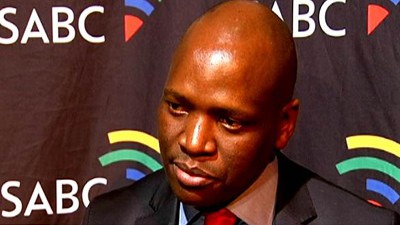
SABC COO Hlaudi Motsoeneng is widely blamed for the public broadcaster’s current woes.
Photo from SABC website
1 August 2016
Wednesday will be the climax of probably the most fractious and bitter political campaigning, certainly at a local level, that the country has seen since 1994. And, whatever the outcome, it will have repercussions throughout society, not least within the trade union movement and, in particular, among the various sections of what was once a united Cosatu.
The situation will be exacerbated by the financially ruinous farce at the SABC. And this involves the Cosatu-aligned Communications Workers’ Union (CWU) that is widely regarded as having cozied up to the discredited management. The other once militant union with its origins in the anti-apartheid struggle, the Media Workers Association (MWASA), a Nactu affiliate, has simply faded from the scene.
This may be a portent for the political front, where the name of Nelson Mandela is being bandied about by many of scores of parties, all trying desperately to appropriate something of the icon’s prestige. Along with race and ethnicity, Heaven and Hell have also come into play with President Jacob Zuma vowing that those who desert the ANC are destined for an everlasting bonfire.
Clearly, in his view, the majority of National Union of Metalworkers (Numsa) members and the various fragments from Cosatu unions who have joined them, are in league with the Devil. Apparently, therefore, the majority of the Food and Allied Workers’ Union delegates who, in six provincial congresses, voted recently to leave the ANC-led alliance are also headed that way. Or at least to purgatory.
But perhaps not. Despite wishing to depart from the alliance, the rebellious unionists may still put their crosses in what have been claimed as the divinely ordained boxes. That may well happen or, as also seems likely, many disillusioned ex or would-be ex Cosatu unionists will abstain, not seeing any viable alternative to the ANC.
Some have argued for more than 20 years that the ongoing affiliation to a political party in power is, in itself, reneging on the concept of principled unity that has always been the credo of the trade union movement.
The alliance of “all anti-apartheid forces” was an understandable demand in the battle to defeat apartheid, a goal seen mostly in simplistic terms as winning the vote for all citizens. Once that was achieved within the framework of a free enterprise — capitalist — country and world, race was removed from parliamentary politics. But massive residues remained in all other sectors of society.
The greatest contradiction was when the ANC became the government and, therefore, the largest employer in the land. This, critics maintained, would result in fragmentation and disarray among once determined fighters for human rights.
A classic example of such disarray is evident at the SABC, especially following the controversial sacking of eight journalists. But the vaccuum left by the CWU and MWASA has been well filled by Solidarity and the 1 086-member Broadcasting Electronic Media and Allied Workers’ Union (Bemawu).
However, to the chagrin of most strugglista unions, Solidarity’s roots lie with the segregationist Mynwerkers Unie with its stress on a claimed white, Afrikaner “nation”. Bemawu’s orgins lie within the SABC from 1950.
So there is more than a touch of irony in the fact that it was Solidarity and Bemawu that this week took the SABC to court. In the process, they became the constitutional standard bearers of freedom of expression at the public broadcaster where management capitulated in the face of having to personally pay substantial costs.
This sorry chapter at the SABC may now be coming to an end, but will probably do so amid much buck passing and finger pointing. Some of this may spill over into the recriminations that will almost certainly follow Wednesday’s poll, whatever the outcome.
As a result, this seems likely to herald a period of even more political turbulence, especially if and when the promised new and Numsa-led labour federation makes its appearance.
Views expressed are not necessarily GroundUp’s.